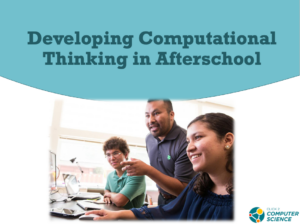Computational thinking builds problem-solving strategies to help youth prepare for their future. Computational thinking can be a game changer for young people when they learn problem solving skills with computers. This virtual workshop focuses on strategies for developing a computationally rich environment in afterschool – with or without computers – and resources so you can get started right away. Click the image to go to the webinar recording.
In this blog, I’ve gathered all the ideas from the workshop in January along with some of the research we used and great ideas shared by the workshop participants. We discussed how computational thinking in used in our daily life as we are cooking, finding a parking space in a crowded lot or create timelines and To Do lists for my projects.
Participants shared ideas for creating computationally rich environments in out-of-school programs, such as:
- Being very joyful/celebratory (and almost silly) in celebrating accomplishments
- Working CS unplugged activities into themed units
- Using Scratch to create messages as part of a theme – 4-H National Youth Science Day Challenge – Game Changers has an activity called Pitch Your Passion where youth use Scratch to build a project that communicates about a idea or case they feel strongly about
- Wearable Technology from 4-H lets youth solve real world problems and practice the engineering design process while creating unique projects.
- Programable robotics kits like LEGO Spike Prime with lessons that are easy to implement in afterschool
- Scratch Jr. for young kids – it is designed for 5-7 year-olds with lots of video help
Someone asked, “Where can we find facilitator training on these programs, to build confidence in the afterschool staff?” and the Quick Start pathways on Click2ComputerScience were recommended to help with facilitating trainings. There are also a lot of videos on the site where you can see someone facilitating CS activities.
Click2Science/Click2ComputerScience Resources:
- Training Resource: You’re a Computational Thinker
- Coaching Resource: Science is for Everyone
- Video: Why Do We Do Computer Science
Other Resources:
- Computational Thinking lesson plan and video from Code.org
- Article: Computational Thinking: videogames, educational robotics, and other powerful ideas to think with (2015)
- Guide: SciGirls Strategies: How to Engage Girls in STEM
- Blog from NSTA How to Engage Girls in STEM
- Web site: US Department of Education You Belong in STEM Initiative

